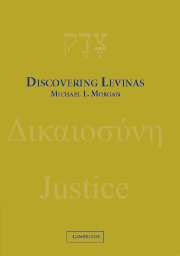Book contents
- Frontmatter
- Contents
- Preface
- Acknowledgments
- 1 Auschwitz, Politics, and the Twentieth Century
- 2 Phenomenology and Transcendental Philosophy
- 3 The Ethical Content of the Face-to-Face
- 4 Philosophy, Totality, and the Everyday
- 5 Meaning, Culture, and Language
- 6 Subjectivity and the Self
- 7 God and Philosophy
- 8 Time, Messianism, and Diachrony
- 9 Ethical Realism and Contemporary Moral Philosophy
- 10 Beyond Language and Expressibility
- 11 Judaism, Ethics, and Religion
- Conclusion: Levinas and the Primacy of the Ethical – Kant, Kierkegaard, and Derrida
- Appendix: Facing Reasons
- Bibliography
- Index
2 - Phenomenology and Transcendental Philosophy
Published online by Cambridge University Press: 05 June 2012
- Frontmatter
- Contents
- Preface
- Acknowledgments
- 1 Auschwitz, Politics, and the Twentieth Century
- 2 Phenomenology and Transcendental Philosophy
- 3 The Ethical Content of the Face-to-Face
- 4 Philosophy, Totality, and the Everyday
- 5 Meaning, Culture, and Language
- 6 Subjectivity and the Self
- 7 God and Philosophy
- 8 Time, Messianism, and Diachrony
- 9 Ethical Realism and Contemporary Moral Philosophy
- 10 Beyond Language and Expressibility
- 11 Judaism, Ethics, and Religion
- Conclusion: Levinas and the Primacy of the Ethical – Kant, Kierkegaard, and Derrida
- Appendix: Facing Reasons
- Bibliography
- Index
Summary
I have made a point of explaining how I approach Levinas in these pages. My goal is to place him and his work within the tradition of Anglo-American philosophy. I will not ignore his relationships to influences such as Bergson, Husserl, Heidegger, Blanchot, Rosenzweig, and others, but if I hope to construct a bridge between Levinas's thinking and a different philosophical tradition, that will involve transporting his work rather than leaving it wholly in its own environment. Thus far, I have tried to observe Levinas doing what a philosopher engaged with ethical, political, and religious matters in the twentieth century might be expected to do: comment on and consider critically the crisis of the century and events within it. Now it is time to turn to Levinas's philosophical thinking and his writings and to ask about the relationship between his philosophy and the assessments and judgments we have seen him making. This will require that we take a brief preliminary look at the content of his “ethical metaphysics” and begin to examine it by asking what Levinas is doing in the course of that thinking, what kind of thinking it is. In the early part of this chapter, then, I will be making a first pass through his thinking, especially in its early development, a project that will unavoidably use terms yet to be clarified as well as paraphrases that may simplify too much and have a certain impropriety and vagueness about them.
- Type
- Chapter
- Information
- Discovering Levinas , pp. 39 - 60Publisher: Cambridge University PressPrint publication year: 2007



